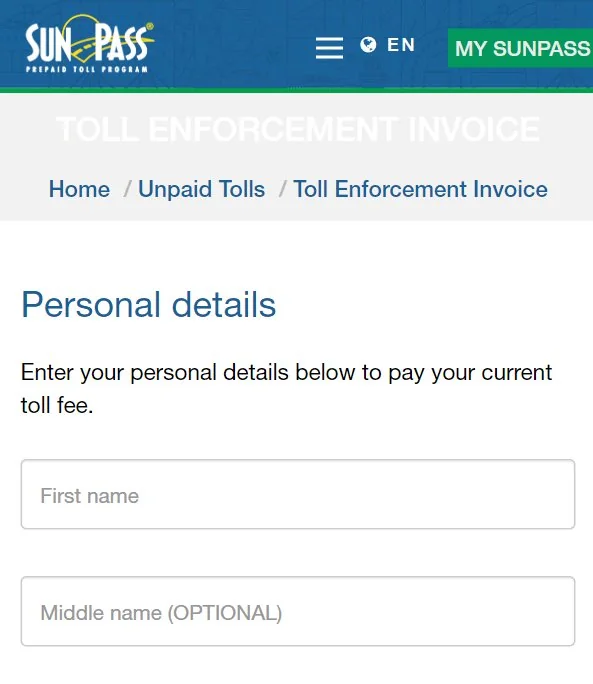Introduction To Sunpass Toll Scam
If you’ve recently received a text message claiming to be from SunPass about unpaid tolls, be cautious—it’s a Sunpass toll scam. SunPass has issued a warning on its website, alerting customers that these messages are fraudulent. The texts claim unpaid tolls and urge recipients to click on a link to avoid additional charges. However, SunPass has clarified that it does not request payments or immediate actions via text. These messages are designed to deceive and steal personal information. SunPass advises customers to avoid clicking on any suspicious links and to report such messages immediately.

What is a Phishing Scam?
Phishing scams are attempts by fraudsters to obtain sensitive information such as usernames, passwords, and credit card details by masquerading as a trustworthy entity in electronic communications. These scams often involve emails or text messages that appear legitimate but contain links to fraudulent websites.
SunPass Phishing Scam Alert
SunPass customers have been targeted by a new phishing scam. Texts have been sent to many customers, warning them about unpaid tolls and urging them to settle their balance to avoid additional charges. A link is provided in the text message, which leads to a fraudulent website designed to collect personal information.

SunPass’s Official Warning
SunPass has made it clear on its website that it does not ask customers via text to make a payment or take immediate action on their accounts. The messages are part of a phishing scam attempting to trick users into clicking on a fraudulent link.
Official Communication Channels:
- Email: customerservice@sunpass.com or noreply@sunpass.com
- Text: 786727
What Should You Do if You Receive the Scam Text?
If you receive a text claiming to be from SunPass and warning you about unpaid tolls, do not click on the link. Instead, delete the message immediately. Clicking on the link will direct you to a fraudulent website that attempts to collect your personal information.
How to Identify a Phishing Scam
Phishing scams can be sophisticated, but there are some telltale signs to watch out for:
- Sense of Urgency: Scammers often create a sense of urgency to prompt immediate action, such as warnings about unpaid bills or account suspension.
- Unfamiliar Sender: Verify the sender’s email address or phone number. Legitimate companies will use official communication channels.
- Suspicious Links: Hover over links to see the actual URL. Scammers often use URLs that look similar to legitimate sites but have subtle differences.
- Poor Grammar and Spelling: Many phishing messages contain grammatical errors and spelling mistakes.
Previous Phishing Scams Targeting SunPass Users:
This isn’t the first time SunPass customers have been targeted by phishing scams. In May, Florida residents received similar text messages about outstanding charges on their SunPass accounts. Clicking the link led to legitimate-looking but fraudulent websites designed to collect personal information and charge users.

Protecting Yourself from Phishing Scams
- Verify Before You Click: Always verify the legitimacy of the message by checking the official SunPass website or contacting customer service directly.
- Do Not Share Personal Information: Never provide personal information, such as your Social Security number or credit card details, in response to unsolicited messages.
- Use Security Software Install and maintain antivirus software, firewalls, and email filters to reduce phishing attacks.
- Be Cautious of Links and Attachments: Avoid clicking on links or downloading attachments from unknown or suspicious sources.
- Report Suspicious Activity: Report any suspicious messages to the appropriate authorities, such as the Federal Trade Commission (FTC) or your local consumer protection agency.
Examples of Fraudulent Websites Shut Down
In the past, the Florida Cyber Fraud Enforcement Unit shut down ten fake SunPass websites, including:
- sunpass-service.com
- sunpass-help.com
- sunpass-online.com
- sunpass-florida.com
- sunpass-toll.com
- sunpass-tolls.com
- sunpass-express.com
- service-sunpass.com
- tolls-sunpass.com
- web-sunpass.com
These websites were created to look legitimate and trick users into entering personal information or making payments.
Staying Safe Online
With phishing scams becoming increasingly common, it’s crucial to stay vigilant and informed. Here are some additional tips to protect yourself:
- Educate Yourself: Learn about common phishing tactics and how to recognize them.
- Monitor Your Accounts: Regularly check your bank and credit card statements for any unauthorized transactions.
- Enable Two-Factor Authentication: Use two-factor authentication (2FA) for an extra layer of security on your accounts.
- Keep Software Updated: Ensure your operating system, browsers, and security software are up to date to protect against the latest threats.
Conclusion
Phishing scams like the recent SunPass text message scam are designed to trick you into revealing personal information or making payments to fraudulent websites. Always verify the legitimacy of messages claiming to be from companies like SunPass, and never click on suspicious links. By staying informed and cautious, you can protect yourself from falling victim to these scams.
Remember, SunPass will never ask for payments or immediate action via text message. If in doubt, visit the official SunPass website or contact their customer service for verification. Stay safe and protect your personal information from scammers.
Stay tuned for more updates on this landmark acquisition and its implications for the tech and cybersecurity sectors. At The Scam Protector, we save people from getting scammed by raising awareness and informing them about prevalent online scams. You can do it too just by joining our tribe on Twitter , Facebook, Quora, Reddit, LinkedIn.




